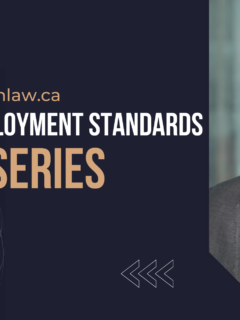A small percentage of employers across Canada are regulated by the Federal Canada Labour Code (“CLC”), and not provincial employment standards. Employers in the following industries are, generally, regulated by the CLC: Employers in the above industries who are governed by the CLC and not provincial employment standards have special layoff rules. To learn about layoffs under …
Constructive Dismissal
Employees who quit are not entitled to severance. Employees only get a severance package if they are fired. Accordingly, in terms of money, it is better to get fired than to quit. You get money if you are fired. You don’t get money if you quit. It is that simple. With regard to the negative …
Many are wondering, is a temporary layoff caused by Coronavirus COVID-19 related business slowdowns and closures a “constructive dismissal”? Temporary layoff and constructive dismissal A “temporary layoff” is a procedure enshrined in government minimum employment standards legislation called the Employment Standards Act (“ESA”), which permits employers to temporarily layoff employees without triggering a “Termination” as …
In order of appearance, from newest to oldest, here are the employment law cases that shaped Ontario and to some extent every jurisdiction in Canada in the 2010s: Amberber v. IBM Canada Ltd., 2018 ONCA 571: Here, the Ontario Court of Appeal provided some clarity on the enforceability of termination clauses especially in regard to …
Constructive dismissal permits an employee to stop working and demand termination pay (i.e. severance pay) or failing that sue for wrongful dismissal even though their employment was never terminated. In other words, a constructive dismissal gives an employee the right to quit their job and get a severance and employment insurance (EI). Normally an employee is not …
Sometimes, an employer decides to force an executive to sign a new contract while they are still working (usually in case of promotion, or because the executive doesn’t have a contract already, or the employer wants to update the termination clause in an existing contract, or because the employer simply thinks the executive earns too …
March 25 Update: In light of the COVID-19 pandemic, the Canadian government has proposed legislation to establish a new kind of income replacement benefit called the Canada Emergency Response Benefit (CERB). The CERB will temporarily replace all new applications for Employment Insurance once it is in place. We don’t yet know if the CERB will require an …
Introduction The Ontario Court of Appeal, in Brake v. PJ-M2R Restaurant Inc., 2017 ONCA 402 (CanLII), recently clarified the law of mitigation. The duty to mitigate is an employment law principle that requires employees who are terminated without reasonable notice (i.e. a wrongful dismissal) to look for a new job. If a new job is …







